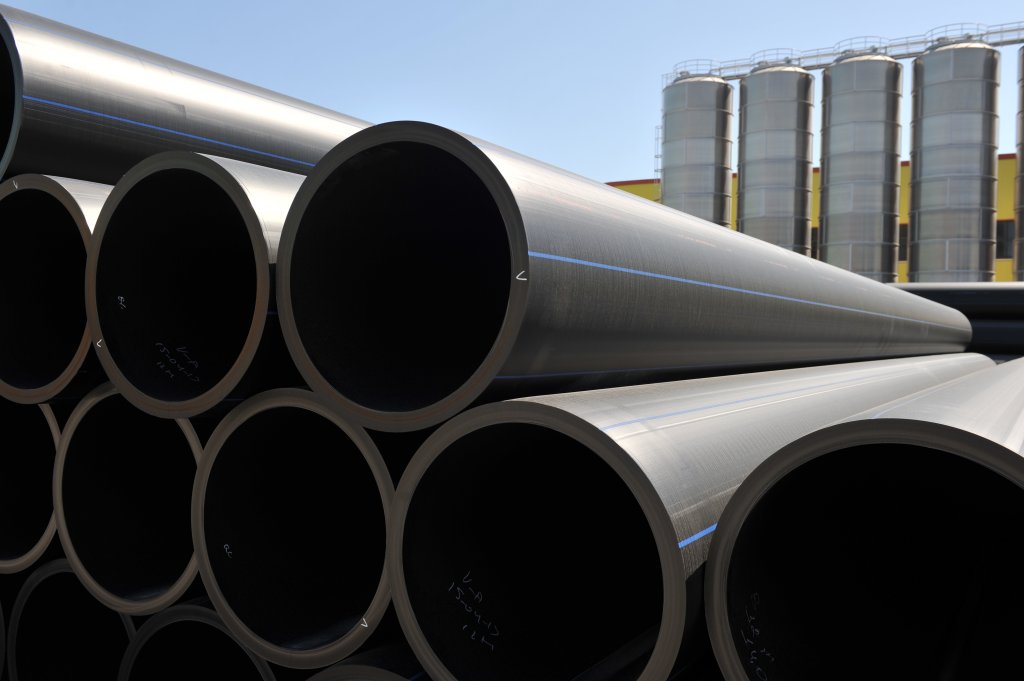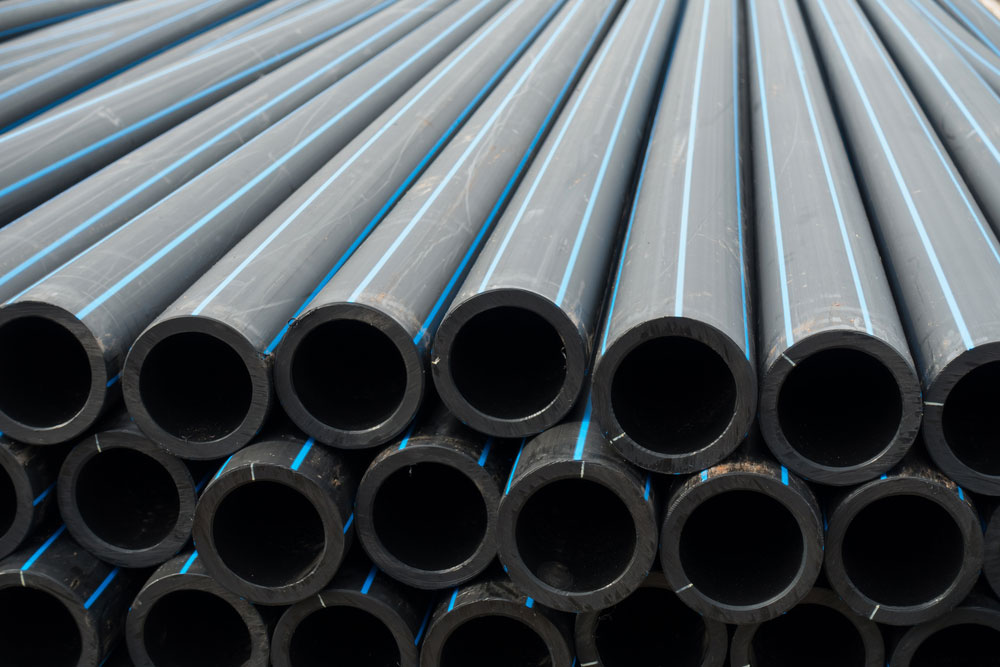A Comprehensive Guide to the Different Uses HDPE Pipe in Building And Construction and Industry
HDPE pipelines have emerged as a pivotal element in modern-day building and commercial applications. Their distinct residential properties, such as resistance to corrosion and light-weight design, make them appropriate for a large range of usages. From water supply systems to agricultural watering, HDPE pipes supply services that enhance effectiveness and sustainability. Understanding their varied applications is important for specialists looking to maximize infrastructure. What certain advantages do these pipelines offer each sector?
Water System and Circulation Equipments
Water and distribution systems are vital elements of city infrastructure, typically relying upon high-density polyethylene (HDPE) pipes for their toughness and performance. These systems transport potable water from treatment facilities to consumers, making certain accessibility and security. HDPE pipelines are preferred for their resistance to corrosion, chemicals, and extreme temperature levels, which boosts their durability and decreases maintenance prices. Additionally, their light-weight nature permits much easier installment and transport, making them optimal for numerous metropolitan and country applications.
The adaptability of HDPE pipelines allows them to be installed in limited areas and around barriers, lessening the demand for substantial excavation (Midland TX HDPE Pipe Fittings in Stock). Their smooth indoor surface decreases friction losses, enhancing water flow prices. As cities proceed to grow, the demand for trusted water systems boosts, positioning HDPE pipelines as a sustainable service for contemporary framework jobs. Their proven track document makes them a favored option amongst engineers and city coordinators alike
Wastewater Monitoring and Treatment
Efficient wastewater monitoring and treatment are essential for preserving public wellness and environmental high quality. HDPE pipelines play a vital role in this procedure as a result of their toughness, resistance to corrosion, and ability to stand up to rough chemicals. These pipelines are commonly used in different applications, consisting of sewer system, stormwater water drainage, and wastewater therapy facilities. Their lightweight nature helps with less complicated installation and transportation, minimizing labor prices and time.
Additionally, HDPE pipelines have a smooth indoor surface that minimizes rubbing loss, advertising effective flow prices. They are likewise much less prone to leakages and failings contrasted to conventional materials, guaranteeing that contaminants are had properly. In addition, their versatility allows for flexibility in different soil conditions, making them ideal for diverse environmental settings. As industries increasingly focus on lasting practices, making use of HDPE pipelines in wastewater management systems lines up with goals for reducing ecological influence and improving source recovery.
Agricultural Irrigation Solutions
In agricultural settings, effective watering solutions are essential for enhancing plant returns and managing water resources. HDPE (High-Density Polyethylene) pipelines play an essential role in contemporary watering systems as a result of their longevity, versatility, and resistance to rust. Their capacity to withstand high pressures makes them optimal for both surface area and subsurface watering applications, ensuring uniform water distribution across fields.
Farmers can use pop over to this site HDPE pipelines in drip watering systems, which supply water straight to plant origins, minimizing wastage and promoting healthy growth. Furthermore, these pipelines are light-weight and very easy to mount, reducing labor costs and setup time. Their long life-span and reduced maintenance demands additionally boost their allure in farming techniques.
HDPE pipes are environmentally friendly, as they can be recycled and do not leach hazardous chemicals right into the soil. This makes them a lasting option for farmers aiming to take on environment-friendly agricultural methods while making best more tips here use of performance.
Industrial Applications and Processes
Flexibility is a hallmark of HDPE pipes, making them indispensable in numerous industrial applications and procedures. These pipelines are commonly utilized in chemical handling markets due to their superb resistance to a vast array of corrosive materials. HDPE's light-weight nature, integrated with high tensile strength, permits for simple installation and lasting performance popular atmospheres.
In the oil and gas sector, HDPE pipelines play a crucial function in transporting hydrocarbons and gases, thanks to their resilience and adaptability - Texas hdpe pipe manufacturer. In addition, they are employed in mining operations for the transportation of slurry and various other products, where conventional piping systems might stop working
HDPE pipelines are increasingly made use of in manufacturing facilities for water supply lines and wastewater management. Their ability to withstand extreme temperatures and pressures makes them appropriate for a variety of industrial procedures. On the whole, HDPE pipes contribute greatly to performance and safety throughout varied commercial applications.
Stormwater Monitoring and Water Drainage Equipments
Stormwater monitoring and water drainage systems are crucial components in urban infrastructure, designed to manage excess rains and lower flooding threats. High-density polyethylene (HDPE) pipelines are significantly made use of in these systems as a result of their durability, flexibility, and resistance to corrosion. These pipelines successfully deliver stormwater away from inhabited areas, reducing surface overflow and stopping waterlogging.
HDPE's light-weight nature promotes less complicated installment, lowering labor costs and construction time. Additionally, its resistance to chemicals and environmental stress factors warranties durability and reliability in numerous environments. Along with traditional water drainage applications, HDPE pipelines are likewise employed in cutting-edge services such as green infrastructure, that includes rainfall gardens and permeable sidewalks.

Often Asked Questions
Just How Does HDPE Pipe Contrast to PVC Pipe in Cost?
In basic, HDPE pipe tends to be a lot more expensive than PVC pipeline because of its boosted longevity and versatility. Long-term expense factors to consider, such as maintenance and life expectancy, might favor HDPE in particular applications.
What Is the Life-span of HDPE Pipes Under Diverse Problems?
HDPE pipelines usually have a life-span of 50 to 100 years, depending on ecological problems, setup techniques, and usage. Elements such as temperature level, soil kind, and direct exposure to chemicals can significantly affect their resilience.
Can HDPE Water Lines Be Recycled After Usage?
Yes, HDPE pipes can be reused after usage. The reusing procedure includes thawing down the product, enabling it to be repurposed right into brand-new products, consequently promoting sustainability and lowering environmental effect associated with plastic waste.
Exist Any Kind Of Certain Installment Difficulties With HDPE Pipes?
Installment obstacles with HDPE pipes consist of proper jointing methods, ensuring adequate trench conditions, and handling thermal development. In addition, proficient labor is needed to manage specific equipment, which can complicate the installment procedure in different environments.

What Qualifications Should I Seek When Buying HDPE Pipelines?
When buying HDPE pipes, one need to seek qualifications such as ASTM, AASHTO, and ISO, which validate quality and conformity with industry standards, assuring resilience and performance in various applications. - American Plastics HDPE Pipe for Oilfield